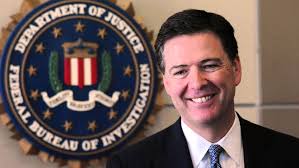WASHINGTON — The director of the F.B.I. reignited the factious debate over a so-called “Ferguson effect” on Wednesday, saying that he believed less aggressive policing was driving an alarming spike in murders in many cities.
James Comey, the director, said that while he could offer no statistical proof, he believed after speaking with a number of police officials that a “viral video effect” — with officers wary of confronting suspects for fear of ending up on a video — “could well be at the heart” of a spike in violent crime in some cities.
“There’s a perception that police are less likely to do the marginal additional policing that suppresses crime — the getting out of your car at 2 in the morning and saying to a group of guys, ‘Hey, what are you doing here?’” he told reporters.
Mr. Comey was wading back into a dispute from last fall that pitted him against some of his bosses at the White House and the Justice Department and one that roiled racial tensions over confrontations between police officers and minorities.
He first raised the idea in October that a “chill wind” had deterred aggressive policing. But Obama administration officials distanced themselves from Mr. Comey at the time. They said they had seen no evidence to support the idea of a “Ferguson effect,” named after the 2014 shooting by a police officer of an unarmed black man in Ferguson, Mo., which sparked widespread protests.
Obama administration officials declined to comment on Wednesday about Mr. Comey’s latest remarks, which were sharper in tone than his previous statements. But some dissenters said he was needlessly stirring up an unproven and divisive notion.
“He ought to stick to what he knows,” James O. Pasco Jr., executive director of the National Fraternal Order of Police, said in a telephone interview. The organization has more than 330,000 members.
“He’s basically saying that police officers are afraid to do their jobs with absolutely no proof,” Mr. Pasco said.
Mr. Comey’s remarks were prompted by a private briefing he received on Wednesday about rising crime rates in more than 40 cities during the first quarter of 2016.
He said the new statistics, which have not been made public, showed a significant jump in murder rates in many cities. The numbers rose even more quickly than last year, Mr. Comey said. In 2015, rising murder tallies in Washington, Baltimore, Milwaukee, St. Louis and other cities made national news.
The two cities Mr. Comey singled out in the latest tallies were Las Vegas and Chicago. He said most of the murder victims were either black or Hispanic men, although F.B.I. officials declined to provide specific figures and said the data would likely be released later this week. In Chicago, where violence and police shootings have angered the city, officials say that as of April, murders were up 54 percent from last year, and shootings were up by 70 percent.
Mr. Comey said that he could not fully explain the trend or the major differences from one city to the next.
“I don’t know what the answer is, but holy cow, do we have a problem,” he said.
“It’s a complicated, hard issue, but the stakes couldn’t be higher. A whole lot of people are dying,” he said.
He said that the spike in violent crime deserves more national attention from scholars, the media, and the public.
“Something is happening,” he said. “A whole lot more people are dying this year than last year, and last year than the year before and I don’t know why for sure.”
Asked about his past views on the “Ferguson effect” as a possible explanation, Mr. Comey said he rejected that particular term, but added that he continued to hear from police officials in private conversations that “lots and lots of police officers” are pulling back from aggressive confrontations with the public because of viral videos.
He said that the phenomenon “could well be an important factor in this.”
More than many of his predecessors at the F.B.I., Mr. Comey has not hesitated to use the prestige of his office to draw attention to difficult and sometimes unpopular issues involving race and crime.
Last year, he gave an unusually candid speech at Georgetown University about the tense relationship between police and blacks, saying that minorities are scrutinized more closely than whites because of bias. In the talk, he cited a song from a Broadway musical called “Everyone’s a Little Bit Racist.”
That won him praise from some advocates of minorities, but in the debate over the Ferguson effect, he has angered some minority leaders who say the real problem remains policing in their communities that, if anything, is too aggressive, and far short of passive.
One reason for the sharp disagreement is that there is little reliable national data on the topic, even at the F.B.I.
The F.B.I. has promised to build a database compiling police shootings and confrontations with members of the public, but Mr. Comey said that project was at least two years from completion.
“That does frustrate me,” he said.


